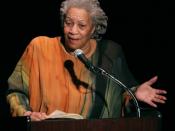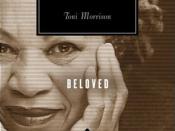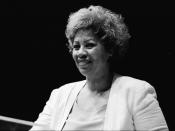Toni Morrison: Bathed in Tradition
It is often said that people pursue the "Great American Dream," but what exactly is it? For some it is getting rich quick, inventing something incredible, or simply living a good life and raising a family. Many also believe that one of life's goals is to write the Great American novel. This is a difficult task, for one must be at the top of their craft, as well as be able to reach many people on different levels. One such author who has accomplished this feat is the African-American author Toni Morrison. Morrison holds a great deal of prestige in the writing community, as she is both the winner of the Nobel Prize for Literature as well as the Pulitzer Prize, the top honor a writer may receive. She writes about race and other contemporary issues from a perspective that not many readers have been exposed to.
Toni Morrison has found success in writing with tones of African-American history, folklore, and music. As novelist, critic, professor, editor, or mentor to other writers, Toni Morrison has had a profound impact upon the literature and culture of the twentieth century.
Toni Morrison's life can be seen from a number of accomplishments and influences as more fulfilling than any master writer could want. One influence is her childhood's rich background in tradition and history. A second influence was her education at some of the best universities the country has to offer. Morrison's life just
before writing her first novel gave her life experience which would prove invaluable. She had the opportunity to exercise influence over many black authors and helped make their works known. Also, her list of novels is impressive and well received. The awards she received for them are proof enough of her excellent work.
Toni Morrison was born Chloe Anthony Wofford on February 18, 1931 in the poor, multi-racial town of Lorraine, a suburb of Cleveland, Ohio (Sinclair 361). She was one of four children of Ramah Willis Wofford, a homemaker who sang in the church choir, and of George Wofford, who held a variety of jobs, including car washer, steel mill welder, and road construction and shipyard worker (Bolden 149). Morrison grew up with strong influences from both her parents and grandparents. She received a legacy of resistance to oppression and exploitation as well as African American folklore. Her grandparents emigrated from Alabama to Ohio in order to "escape rampant racial violence" (Sinclair 362). Likewise, her father escaped Georgia and settled in Ohio, but found that it was not much easier there. Morrison herself says,
"The northern part of Ohio had underground railroad stations and a history of black people escaping into Canada, but the southern part of the state is as much Kentucky as there is, complete with cross burnings. Ohio is a curious juxtaposition of what is ideal in this country and what is base. It was also a Mecca for black people; they came to the mills and plants because Ohio offered the possibility of a good life, the possibility of freedom, even though thee were some terrible obstacles. Ohio also offered an escape from stereotyped black settings." (363)
It is possible to see that without the strong reminder of how life was for African-American people in this country coming from her parents, Morrison could have grown up unaware and unable to write the way she does now.
Literature was always an important presence in Morrison's childhood and youth. She was the only one in her first grade class who knew how to read when she entered school. As an adolescent she read widely in a variety of subjects, counting the classic Russian novelists Flaubert and Jane Austin as her favorites (363). Her hunger for such difficult and involving texts at such an early age were an indicator of both her aptitude for literature and her solid foundation in the works of great literary authors, which will have an impact on her as she develops novels of her own. Susan L. Blake quotes Morrison's remark that although the books she read in her youth "were not written for a little black girl in Lorain, Ohio...they spoke to me out of their own specificity" (156). During those years Morrison had hopes of becoming a dancer, something greatly valued in the traditions passed down from her grandparents and parents, but her early reading inspired her to "capture that same specificity about the nature and feeling of the culture [she] grew up in" (157).
Morrison's foundation and sense of self was strengthened by the community in which she lived. She was impressed with the cohesiveness of the small black Lorain community that parented and nurtured her for seventeen years. Morrison thinks of it as a "neighborhood," a life-giving and sustaining compound, a village in the traditional African sense.
"So people were taken care of...if they were sick, other people took care of them; if they were old, other people took care of them; if they were mad, other people provided a small space for them, or related to their madness or tried to find out the limits of their madness" (Samuels 5).
Morrison grew up well taken care of, and her sense of community gave her pride in the way her people could live together.
Toni Morrison excelled in her academic school work, and received an education that would allow her to excel in work as a writer in the African-American tradition. She graduated from Lorain High School with honors and went on to attend Howard University, historically one of the most highly regarded black colleges. She graduated from Howard with a B.A. in English and a minor in classics. She describes her years there, during which she changed her name to Toni, with some measure of ambivalence (Bolden 151). She was disappointed with the atmosphere of the university, which, as she has said, "was about getting married, buying clothes and going to parties. It was about being cool, loving Sarah Vaughan (who only moved her hand a little when she sang) and the Modern Jazz Quartet" (Sinclair 362). This was a big difference from the community in which she grew up, so to offset the influences of these sorts of preoccupations, she became involved in the Howard University Players and traveled with a student-faculty drama troupe that took plays on tour throughout the South during the summers (363). Her involvement in the Drama department exposed her to playwriting and showed her another aspect of written expression which she had not previously known. After graduating from Howard in 1953, she went on to receive her M.A. in English from Cornell University,
and started her teaching career at Texas Southern University, where she could begin writing her first novels.
Morrison did not immediately start writing after graduating from Cornell. She taught English full time at Texas Southern University from 1955 to 1957 and returned to teach at Howard from 1957 to 1964. At Howard she met and married Harold Morrison, a Jamaican architect; they had two sons, Harold Ford and Slade Kevin (Sinclair 363). It was then that she became forever known as Toni Morrison. Morrison says little about her marriage but has remarked upon the sense of frustration she experienced during that period: "It was as though I had no judgment, no perspective, no power, no authority, no self--just this brutal sense of irony, melancholy and a trembling respect for words" (363). She could hardly find time to contribute to any form of writing while working full time and trying to raise a family. Morrison divorced her husband around the same time she left Howard, in 1964.
Morrison found herself free to write and began cultivating childhood memories into novels. After the divorce, she took her two sons back with her to Lorain for eighteen months. During this time she joined a writer's group, and wrote a story that would later become her first novel, The Bluest Eye (Samuels 6). It was also at this time that she began to work in publishing, first as and editor at L.W. Singer, the textbook subsidiary of Random House in Syracuse, and then as a senior editor at Random House's headquarters in New York City. While working in Syracuse, she worked on the manuscript of what was to become The Bluest Eye, based on a memory from Loraine of a black girl who wanted blue eyes (Bolden 155). In a conversation with Gloria Naylor, she suggests that she resumed work on the novel almost as if to write herself back into existence:
"I used to live in this world, I mean I really lived in it. I knew it. I used to really belong here. And at some point I didn't belong here anymore. I was somebody's parent, somebody's this, somebody's that, but there was no me in this world. And I was looking for that dead girl and I thought I might talk about that dead girl, if for no other reason than to have it, somewhere in the world, in a drawer" (Sinclair 363).
She sent part of a draft to an editor, who liked it enough to suggest that she finish it. The Bluest Eye was published in 1970.
Morrison was not familiar with writing from most other African-Americans. She was first exposed to the true nature of African-American oppression in the United States during her college and early professional years. While touring the South with the Howard Players, she witnessed the fear and repression in the lives of Southern blacks. Many people were amazed that Morrison could write so well in the black tradition with such little exposure to other black writers, but she explains how she was able to make her distinct fiction so similar yet different to the others. She says, "The language, only the language...it is the only thing that lack people love so much--the saying of words, holding them on the tongue, experimenting with them. It's a love, a passion" (Bolden 159). She took what she had seen in her travels, drew on the stories of her parents and grandparents, as well as what she felt in herself to write the way she does. Morrison claims that the fact her writing resembles other African-American writes shows that the tradition is real (159).
Toni Morrison had an important impact on the careers of many other African-American writers. As senior editor at Random House, Morrison brought a number of
black writers to the publisher's list, including Toni Cade Bambara, Angela Davis, Henry Dumas, and Gayl Jones (Sinclair 364). From 1967 until 1988 Morrison taught at colleges and Universities including Yale, Bard, the State University of New York at Purchase, and the State University of New York at Albany, as well as a Professorship of the Humanities at Princeton University, which she still holds (364).
Morrison affected these black authors the most through her own writing. Her first novel The Bluest Eye was about a young girl who was abused in everyway possible, and believed that everything would be ok if only her eyes were blue. Morrison tried to "undertake a cerebral investigation of the heroine, that in the end proved the history of making a demented personality (Samuels 7). Sula, published in 1973 as her second novel, contrasts with The Bluest Eye. It lays bare the "unyielding personality of a pariah", the title character, who refuses to "succumb to the codes, values, and standards of both the dominant culture and her immediate environment" (7). One of Sula's main themes, individuality, was appropriate for the time in which it was published. Many African-Americans could relate and try to follow the examples and instances in the work, and was widely popular (Bolden 156). Commenting on the book, Morrison says, "What we blacks have to do in reintroduce ourselves to ourselves. We have to know the past so that we can use it for now" (Samuels 8). Samuels claims that the main theme of her third novel, Song of Solomon, is that "truth compels one to get in touch with his or her heritage in order to comprehend and appreciate one's true self" (8). Morrison is trying to do with this novel what her parents and grandparents did for her: reveal the importance and significance of the traditions of one's people to the individual self. In her fourth novel, Tar Baby, Morrison produced a "truly public novel about the condition of society, examining the
relationships between whites and blacks, men and women, civilization and nature circa 1981" (Bolden 160). She tries to teach others to widen their horizons and see things not just based on race, but on all other aspects of our world. She may no longer be in the classroom, but she still is trying to teach. In her fifth novel, Beloved, she once again focuses on the importance of history and heritage. Her sixth novel, Jazz, takes place in Harlem and shows how important music is in one's culture. Her last novel, written in 1998 is titled Paradise. Toni Morrison has also written numerous essays, plays, articles, and reviews.
Toni Morrison's success is evident in the numerous awards she has won. She has been named numerous times to book clubs across the country, including Oprah's Book of the Month club. She has won the Melcher Book Award, Elmer Holms Bobst Award, as well as the Chianti Ruffino AnticoFattore International Literary Prize. Song of Solomon won the National Book Critics Circle Award and the Friends of American Writers Award, as well as the American Academy and Institute of Arts and Letters Award (Bolden 164). In 1987 she won the Pulitzer Prize, one of her most cherished awards for her work on Beloved. Then in 1993, Toni Morrison became the eighth woman, and first black woman to receive the most prestigious award a writer may receive: the Nobel Prize for Literature. Then in 1996, she received the National Book Foundation Medal for Distinguished Contribution to American Letters (164).
Whether as novelist, critic, professor, editor, or mentor to other writers, Toni Morrison has had a profound impact upon the literature and culture of the twentieth century, both in the United States and around the world. Her narratives make visible stories that might otherwise have been lost, and eloquently represent the complex
workings of oppression, resistance, and tradition in African American communities, past and present.
Works Cited
Bolden, Tonya. And Not Afraid to Dare: The Stories of Ten African-American Women. New York: Scholastic Press, 1998
Sinclair, Richard. American Writers. New York: The Century
Company, 1994
Samuels, Wilfred D. Toni Morrison. New York: G.K. Hall and Co., 1990



Helpful
Good information. It will help me organize my thoughts to write my own term paper about Toni Morrison.
Thanks!
A
2 out of 2 people found this comment useful.